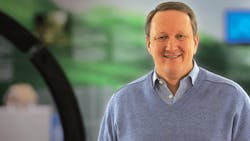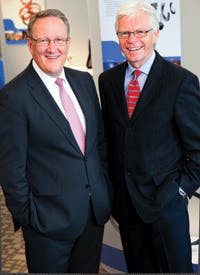In 2007 SKF AB (IW 1000/445) reached a significant milestone that was a century in the making—its 100th anniversary. By virtue of longevity alone, the Gothenburg, Sweden-based manufacturer can rightly be called a sustainable enterprise.
However, its ties to sustainability—in all its definitions—go much deeper. Indeed, the very first product manufactured by the then-fledgling firm in 1907 was the ball bearing, and SKF remains a major bearings manufacturer today. It's a product, the company notes, that reduces friction and thus reduces energy use. Sustainable by its very nature.
See Also: Lean Manufacturing Leadership Best Practices
Today, sustainability remains core to SKF, a global manufacturer that now supplies not only bearings, but also seals, mechatronics, lubrication systems and services across some 40 customer segments. "Sustainability is a guiding light for us," said CEO Tom Johnstone during an August visit to Northeast Ohio.
Johnstone was in the Cleveland suburb of Highland Heights for the grand opening of the fourth SKF Solution Factory in North America and one of 19 around the globe. In keeping with SKF's sustainability efforts, the Cleveland site is pursuing LEED certification. Among the sustainability measures installed at the site is a 2,500-gallon cistern that will collect rain water and has the potential to meet all of the site's grey (non-potable) water needs.
While in Cleveland, Johnstone and other SKF leaders shared with customers, employees and invited guests the role of the SKF Solution Factory as well as the current and future pursuits of SKF. Johnstone also spoke with IndustryWeek about how sustainability will help SKF succeed during the company's second century.
The BeyondZero Initiative
In May SKF announced that it partnered with environmental organization WWF in its Climate Savers program. The program positions companies to be at the "forefront of the low-carbon economy," the organization says, by setting challenging—indeed sector-leading—reduction targets for greenhouse-gas emissions. A third-party monitors the achievements.
SKF's own updated climate strategy includes reducing total energy use by 5% below the 2006 level by 2016 as well as dialing down energy use per production output by 5% year-on-year during the period 2012 to 2016. Targets have been established for suppliers and logistics operations as well.
SKF's partnership with the WWF, however, is simply another step in a direction SKF began to pursue back in 2005. That is when Johnstone, after attending a small conference on climate change, determined that a step-change was needed in the company's approach to the environment.
"I felt there was more we could do," he says.
The "more" grew into BeyondZero, an initiative to not only reduce CO2 emissions in SKF's operations—which include more than 130 manufacturing sites—but also develop a portfolio of products and services to help customers reduce their emissions or improve the energy efficiency of their end products.
Several internal efforts amply demonstrate SKF's commitment to reduced energy usage. For example, its U.S. headquarters in Lansdale, Pa., was awarded LEED Platinum certification following an 18-month, $23 million brownfield redevelopment project. More than $1 million was invested in energy-efficient systems and materials. And in France, the company spent 3.4 million euros on a biomass heating plant to power a bearings factory in Saint Cyr sur Loire that cut emissions by some 30%.
The payback on the biomass investment is outside of the normal payback period SKF typically aims for, but that, Johnstone says, "is a judgment call you have to make. You go there or you don't go there."
"Sometimes we say no and sometimes we say it's the right time to do it. Because if you don't, as management, put your money where your mouth is, if you don't walk the talk, people will say, 'these are nice words but when push comes to shove they don't do it,'" Johnstone says. "We do it, and we get benefits from it as we go. I'm absolutely convinced."
SKF also has launched a portfolio of customer solutions as part of the BeyondZero concept. SKF says the environmental improvements provided by solutions within the portfolio are validated through a life-cycle assessment, and the results will be reviewed annually by KPMG.
SKF estimates the BeyondZero portfolio represented about 2.5 billion Swedish kronor ($373 million) in sales—or about 4% of annual sales—in 2011. The goal is to reach 10 billion kronor ($1.4 billion) by 2016.
Customer Choice
Johnstone recognizes the market will determine the success of SKF's BeyondZero portfolio. Five years ago, he says, 95% of customers "had no real interest" in energy-efficient bearings. That has changed.
"It's the cost of energy and the need to be more efficient in operations. That has changed. There is more interest in 'how can we reduce our energy costs?' Johnstone says.
Legislation certainly has been and will be an added factor, the CEO notes, pointing to automakers as one example. Their requirements to meet stricter emissions targets drives different decision-making than a less-regulated industry sector.
He also expects BeyondZero to appeal to companies with a green agenda.
For the vast majority of potential customers, however, the decision to purchase products from the BeyondZero portfolio will come down to "does this give us a return on our investment?" Johnstone says. "And if it does, they'll do it."
"We have to make sure it makes business sense for them. If it doesn't make business sense, when the business environment gets tougher, these are the things that you jettison. If it makes business sense, you're going to keep doing it even in tougher business times," he says.
An Evolution, Not a Revolution
Now leading the company into its second century, Johnstone says sustained success will be gained by focusing on many of the same elements that helped SKF reach its current status: customers, technology and people. But with a twist.
"We're doing many things the same, but stepping up our commitment to them," he explains. "This is not a revolution we're doing; it's a normal evolution."
What emerges from the renewed commitment will differ from the past, he says. For example, he says not only do customers face different challenges than they did in the past, but the customers themselves are different than the customers of yesterday.
"There wasn't a renewable-energy business," for example, he says. "So just trying to sell to your customer the same thing will not work."
Instead, SKF aims to gain a better understanding of its customers' challenges and their needs "sometimes even before they know them so that you're able to come up with the solutions for them."
To that end, the CEO says the manufacturing firm put 600 more people on the road last year to support the customer. The SKF Solution Factory also plays a role. Part workshop, part engineering center, part training center, the SKF Solution Factory is meant to bring the global company's knowledge closer to the customer in a less-fragmented way than it has in the past.
"We saw that we needed to put our competencies together in a better way to go to the next level of working with our customers. The Solution Factory has enabled us to do that," Johnstone explains.
At present, the suburban Cleveland location is the largest SKF Solution Factory, at 71,000 square feet and 55 associates. The manufacturer has targeted a total of 15 such solution centers in North America by 2016 from the current four, with additional global growth outlined as well.
Stepping Up Innovation
Technology and innovation have always been critical to SKF. Nevertheless, going forward, "stepping up the speed of innovation is critical," Johnstone says.
Putting weight behind those words, SKF in 2011 boosted its investment in R&D by 20% and another 10% in 2012.
"You've got to be open to both customer-required innovation and technology advances," the CEO says, pointing to continuing innovations in both materials and coatings. And while in the past, SKF has called the bearing the "heart" of the machine, "today we are making it the brains of the machine as well," with the addition of electronics, Johnstone says.
Pointing to other areas, Johnstone notes that several years ago the company invested in magnetic bearings.
"For certain applications, like oil and gas, high-speed compressors, it is absolutely the right technology today, but for many applications it's not," he says. "But that could change with technological breakthroughs, and we want to be a leader. We want to be ready for that business as well."
"So we're focusing in the same areas but not just doing the same things. You've got to be open to what new challenges and opportunities are out there," he says.
That, he says, makes for a sustainable company.
About the Author
Jill Jusko
Bio: Jill Jusko is executive editor for IndustryWeek. She has been writing about manufacturing operations leadership for more than 20 years. Her coverage spotlights companies that are in pursuit of world-class results in quality, productivity, cost and other benchmarks by implementing the latest continuous improvement and lean/Six-Sigma strategies. Jill also coordinates IndustryWeek’s Best Plants Awards Program, which annually salutes the leading manufacturing facilities in North America.
Have a story idea? Send it to [email protected].


